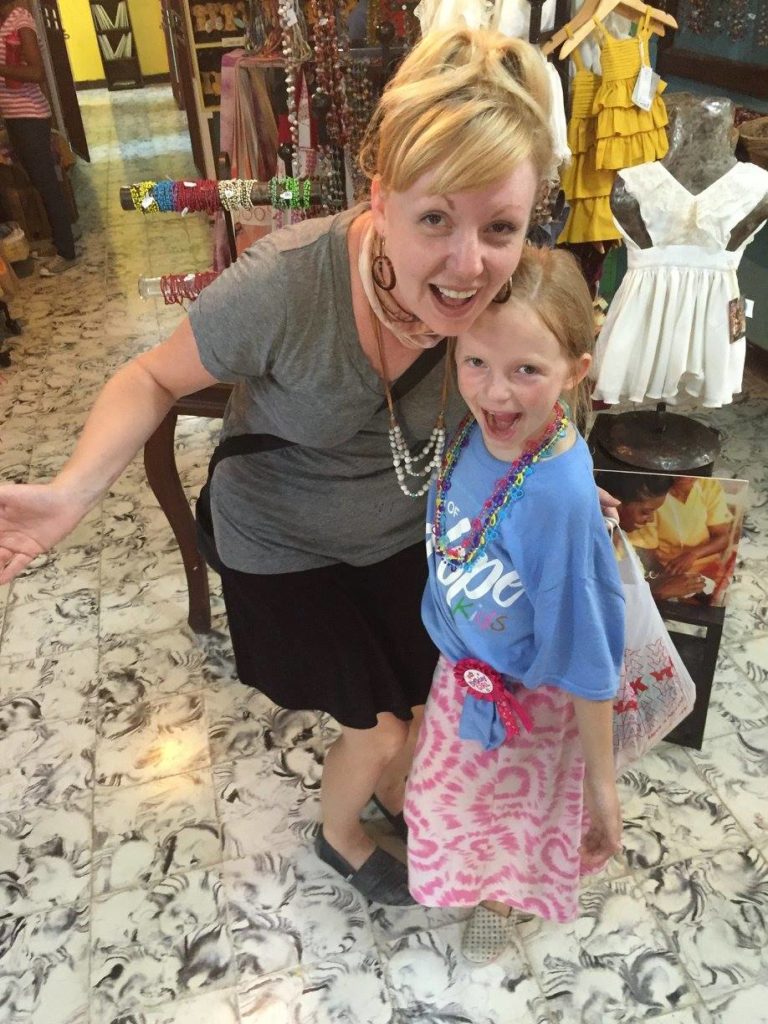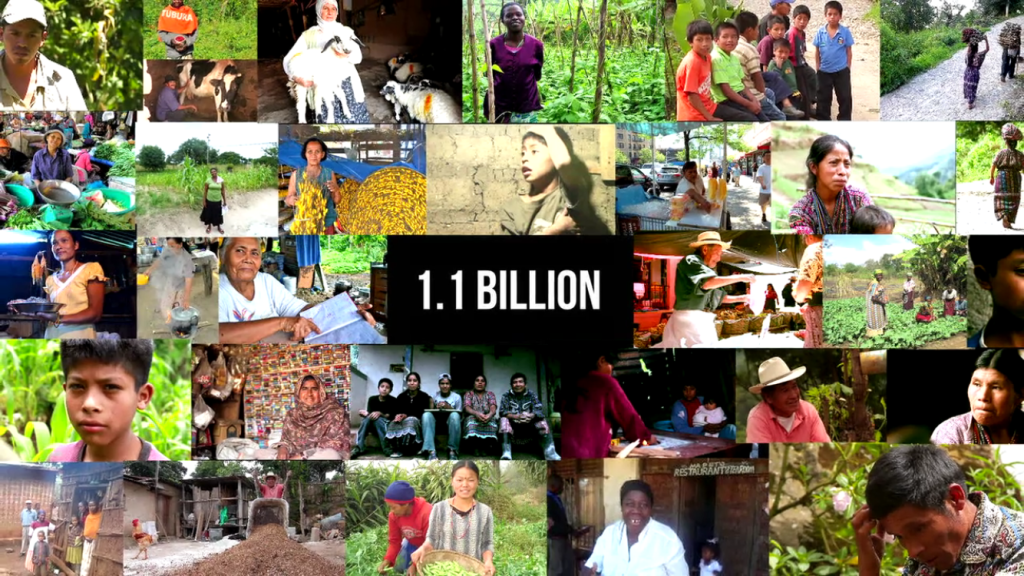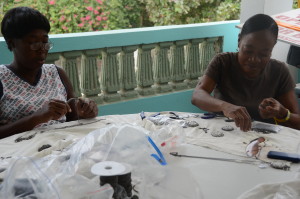I like to shop. I like pretty things. I like to shop for pretty things. I wear the things and decorate my home with them and give the pretty things away as gifts. And I’m not alone. According to Experian, the typical U.S. household today “shells out $12,800 annually on discretionary expenditures.” We spend more money annually on things we don’t even need than the majority of people earn in a year. Statista research shows “69 percent of the world’s population have a net worth of under $10,000 – they account for a mere 3 percent of global wealth. Meanwhile, 23 percent fall into the $10,000-$100,000 bracket and they control 14 percent of worldwide wealth.” What that means is that “in order to be counted among the wealthiest half of the world’s citizens, a person requires a net worth of $3,650.” You only need to earn $10 a day to be considered rich. And more than a billion people actually live on less than $1 a day.
Hear my heart, I do not think money is bad. I do not think spending is bad. Remember the pretty things? But I believe there is a responsibility we have to be good stewards of our resources.
So let me ask. Where do you buy your pretty things? Target is an acceptable response, and you all know my love affair with Walmart. 🙂 But what about making a small change with some of your spending power and adding these, as well? These goods are fair trade, handmade; they’re empowering men and women and bringing entire families out of poverty.
2nd Story Goods: They understand how it feels to want to buy things that are good for the people who made them, the planet, and you. This is why they’ve been working on the ground with artisans in Gonaives, Haiti, for 8 years, creating recycled, handcrafted goods for a livable wage.
ABLE: An ethical fashion brand that employs and empowers women as a solution to end poverty. They are deeply devoted to quality – both in the products they make and the quality of life they aim to provide. They invest in, train, and educate women so they can earn a living, break the cycle of poverty, and thrive.
Eleganttees: Elegantees is for the woman who seeks to find a balance in quality and fashion, while enjoying the comfort and movement of a regular tee. Each item is sewn with integrity in Nepal, bringing entire families out of poverty.
Haiti Design Co.: Haiti Design Co houses and partners with production teams working in many types of artisan crafting, including leatherwork, sewing, jewelry making, aluminum casting, metal work, weaving, beadwork, horn & bone, tailoring, and shoe making. We work to provide consistent employment in-house in order to give job training and stability to individuals in vulnerable situations, as well as raise up artisan leaders to succeed as independent entrepreneurs in the community.
Haiti’s Jewels: Another social enterprise in Haiti, they partner with Haitian artist to design, produce and sell beautiful jewelry using materials like recycled aluminum, hand-cut goat leather, natural Haitian sees, stones, coconut husk and recycled glass. As Haitians develop professional artisan skills the buy land, provide food and shelter and an education for their children, pay medical bills, start their own businesses, make positive change in their communities and support their local economy.
Half United: A small, human-first company, passionate about fighting worldwide hunger. As a brand they make a conscious effort to give back, source, produce, consume, and dispose of resources ethically and responsibly.
Karama: Karama believes in dignity for everyone and believes that much of that dignity comes through creative, purposeful work. So its mission is to provide a market for high quality handcrafted African products and to build relationships with African artisans and businesses. They partner with small local African businesses and assist them in financing, designing and marketing their products in the US, things such as apparel, handbags, jewelry, home accessories and more.
Maguba Shoes: The Maguba concept was created in 2009 with the idea to combine Swedish design with the best traditional clog craftmanship. Natural materials, fun colors, and playful shapes became the trademark recognized by all those who are looking for a handmade, authentic, timeless piece of footwear.
Mata Traders: The Mata Traders mission is to ‘fashion a better world’ by creating designs that celebrate a woman’s originality and empower her to use her dollar for change. They merge uncommonly vibrant style with fair trade practices to make an impact on global poverty – bringing fair wages to artisans in India and Nepal.
Mercy House Global: Mercy House exists to engage, empower and disciple women around the globe in Jesus’ name. It provides for the rescue of pregnant girls in Kenya and provides a home for them, providing dignified work to redeem future generations. It engaging those with resources (us) to say yes to the plight of women in poverty by empowering women around the world through partnerships and sustainable fair trade product development.
Mission of Hope Store: Ethical goods supporting Team Hope across the country of Haiti. Part of the Mission of Hope ministry.
Noonday Collection: Noonday Collection’s mission is to create economic opportunity for the vulnerable. It partners with artisans in the developing world, empowering them to grow sustainable businesses and creating dignified jobs at living wages. Noonday also donates a portion of sales from adoption trunk shows to place orphans in forever families. Check out their jewelry and accessories.

Papillon Marketplace: Shelley, a young mother of two wanted to add to her family through adoption. After spending a week at an orphanage in Haiti, she was surprised to find out that these children had mothers who were alive, but just too poor to care for their children. She set her heart on providing jobs for at risk mothers, so that they would be able to keep their kids. Papillon started because no child should ever be abandoned due to poverty.
Raven + Lily: Raven + Lily currently helps employ marginalized women in India, Ethiopia, Kenya, Cambodia, Pakistan, Guatemala, and the USA at fair trade wages to give them access to a safe job, sustainable income, health care, education, and a real chance to to break the cycle of poverty for themselves and their families. Products include jewelry, gifts, accessories and apparel.
Sanctuary Project: A nonprofit social enterprise providing meaningful employment and job training to women who have survived lives of trafficking, violence, and addiction. It’s a survivor-run organization, offering a safe community for women in transition to grow in practical skills while restoring their lives and hearts
Slum Love Sweater Company: These sweaters are made in Nairobi, Kenya, by people living in one of the world’s largest slums called Kibera. The employees are treated with respect, paid fair wages and given the resources and opportunities they need to provide for themselves and their families.
Sudara Loungewear: Every purchase supports living-wage employment and skills training for women in India who are at a high risk or survivors of sex trafficking.
Synergy Organic Clothing: A family operated business committed to producing clothing with the highest environmental and ethical principles. At the core, Synergy is not only committed to creating clothing with a minimal environmental impact, but also empowering men and women through ethical employment practices.
The Root Collective: The Root Collective partners with small-scale artisan businesses in marginalized communities to promote change through dignified jobs. The artisans, most living in slum communities in Guatemala, own their own businesses and set their own pricing. You’ll find jewelry, accessories and shoes.
Thrive Causemetics: For every product you purchase, Thrive donates to help a women thrive. All products are vegan and cruelty free.
Toms: Speaking of shoes, Toms’ One for One program started with footwear and has now expanded to eyewear, apparel and accessories. This is one of the companies that started the trend and has now given away more than 35 millions pairs of shoes to those in need.
Tribe Alive: Empowering women around the world to fin financial freedom through safe and meaningful employment at fair wages. Success is measured by impact, not profits. The model is moving the fashion industry toward a more humane approach, where the earth and maker as valued equality to the consumer (you and me).
Wanner Label: With the increasing environmental impact we all make on the planet we need to change our ways. There are so many used garments out there just waiting to be re-used so they find these garments and give them a new purpose. Wanner Label sources all materials second-hand and then takes them apart, cut them open and sew them together to create new garments, totally unique.
ViBella: ViBella is a jewelry company committed to much more than just jewelry. More importantly, they’re committed to providing employment, education, and opportunity to artisans in Haiti, Mexico, and right here in the United States.
We all benefit from a flourishing global economy so let’s do our part to make a good and lasting impact.
This is not an exhaustive list, just a few makers of goods I have enjoyed. If you have a company or organization you’d like me to add, find me on Instagram or email kelli {at} kellihuff.com.
Peace & hugs,
Kelli

